healing through food DELICIOUS GUT HEALING RECIPES that don't compromise on flavor

SECTION 1 SECTION 2 SECTION 3 CLASS OVERVIEW GUT HEALTH FAQ’S THE BUILDING BLOCKS OF GUT HEALTH SECTION 4 SECTION 5 SECTION 6 GUT-FRIENDLY RECIPES GUT HEALING SALAD DRESSING RECIPES RESOURCES
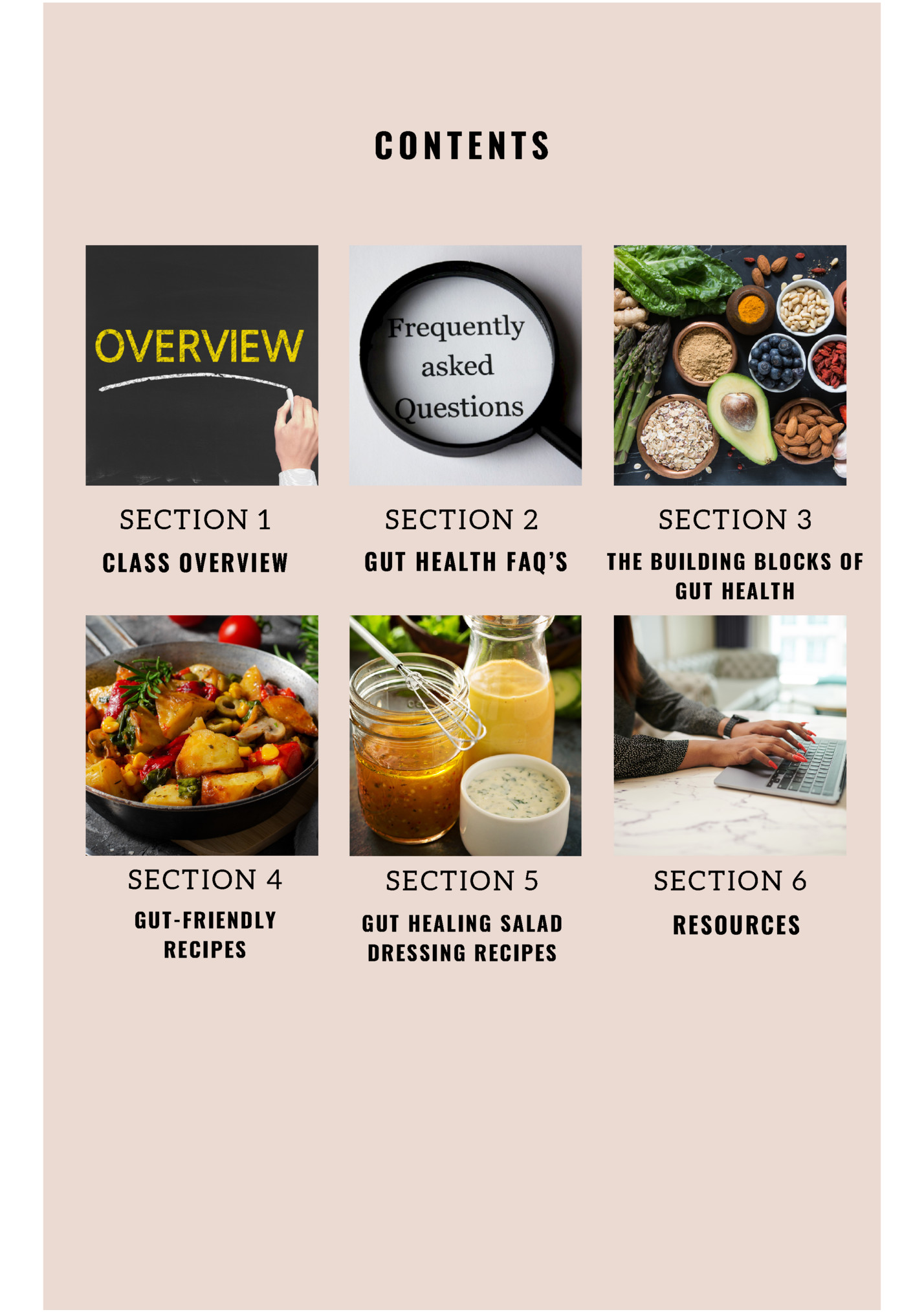
HEALTH COOKING CLASS This booklet is all about exploring how what we eat can make a difference in our gut health—and, ultimately, in our lives. This isn’t just about learning recipes or reading facts—it’s about taking this journey together, discovering how the food we eat can make a real difference in how we feel from day to day. My own path to improving gut health has been a mix of challenges, discovery, and growth. Sharing this information means inviting you to discover what works best for your body, empowering you to make choices that nourish you from the inside out. No one has all the answers, but when we explore these things together, we can support each other, learn from one another, and figure out what works best for each of us. So, as you go through this booklet, remember that you’re not alone. Whether your goal is to support your digestion, reduce inflammation, or just feel better overall, we’re in this together. Let’s explore, learn, and grow as we take these steps toward a healthier, happier gut—one delicious bite at a time. 30
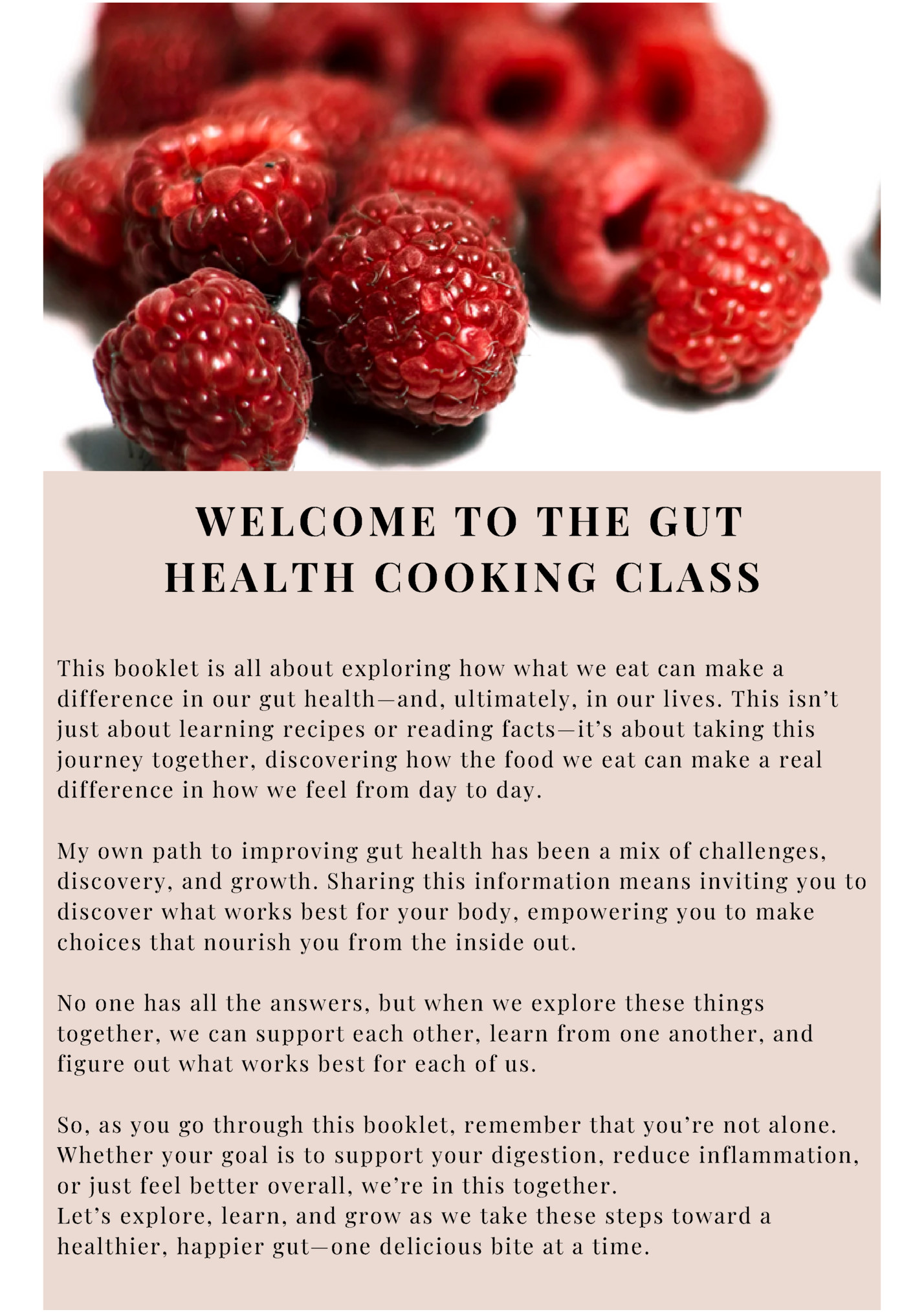
The Importance of Gut Health The Gut Microbiome: The gut microbiome is home to trillions of microorganisms (bacteria, fungi, viruses, and other microbes) that play a key role in digestion, immunity, and overall health. A healthy microbiome helps digest food, produce essential nutrients, and regulate the immune system. Gut-Brain Connection: The gut is often called the "second brain" because of the direct communication between the gut and the brain. The vagus nerve connects the two, meaning that gut health can directly affect mood, mental clarity, and stress levels. Gut and Immunity: Around 70-80% of our immune system resides in the gut. A balanced microbiome supports a strong immune system by helping to protect against harmful pathogens, while an imbalanced gut microbiome can contribute to chronic inflammation and autoimmune conditions. The Link Between Autoimmune Diseases and the Gut Leaky Gut Syndrome: One of the most talked-about connections between the gut and autoimmune diseases is "leaky gut." This is when the lining of the intestines becomes damaged or compromised, leading to gaps that allow undigested food particles, toxins, and microbes to leak into the bloodstream. This can trigger an immune response that contributes to the development of autoimmune diseases. Chronic Inflammation: The gut is central to managing inflammation. When the gut microbiome is out of balance (dysbiosis), it can lead to chronic inflammation throughout the body. This chronic inflammation has been linked to the onset of autoimmune diseases such as rheumatoid arthritis, lupus, and multiple sclerosis. Gut Health and Autoimmune Diseases: Research suggests that autoimmune diseases often begin with gut dysbiosis, which creates an environment where the immune system becomes overactive and attacks the body’s own tissues. Improving gut health through diet and lifestyle changes can help manage or even reverse some of these conditions.
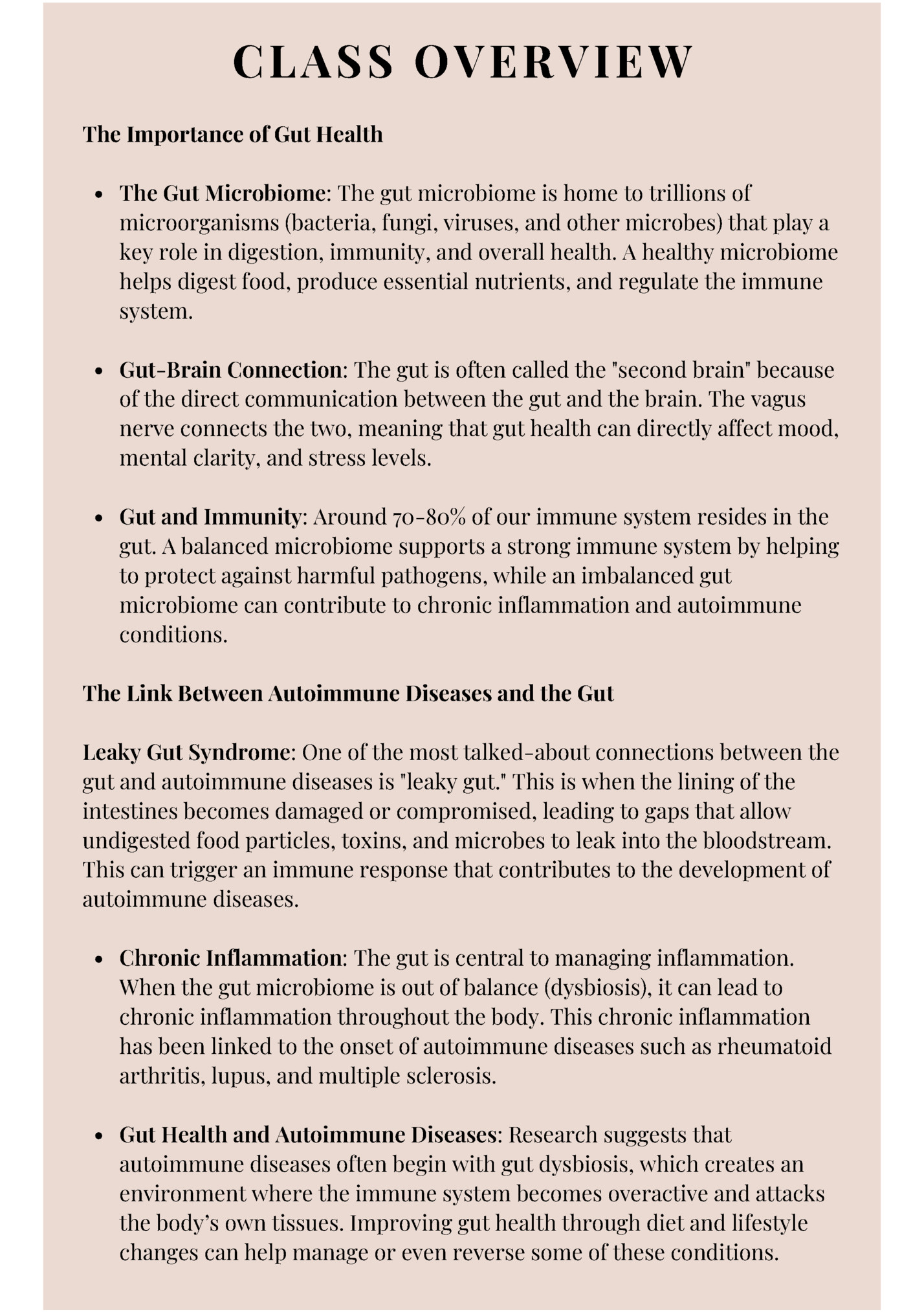
Practical Steps for Gut Health Dietary Changes: Eating a diverse range of whole foods, such as fiber-rich fruits, vegetables, and fermented foods, can promote a healthy gut microbiome. Fermented foods like yogurt, kefir, kimchi, sauerkraut, and kombucha are rich in probiotics that help replenish beneficial bacteria in the gut. Anti-Inflammatory Foods: Foods like turmeric, ginger, and omega-3 fatty acids (from fish or flaxseed) help reduce inflammation and support gut healing. Incorporating these into your diet can help maintain a balanced immune system. Bone Broth: Rich in collagen, amino acids, and gelatin, bone broth is often recommended to heal the gut lining and reduce the symptoms of leaky gut. Avoiding Processed Foods: Highly processed foods, especially those with added sugars and artificial additives, can disrupt the balance of the gut microbiome and contribute to inflammation. Stress Management: Chronic stress can negatively affect gut health by altering the gut microbiome and increasing intestinal permeability. Practices like meditation, yoga, and deep breathing exercises can help manage stress and support gut healing.
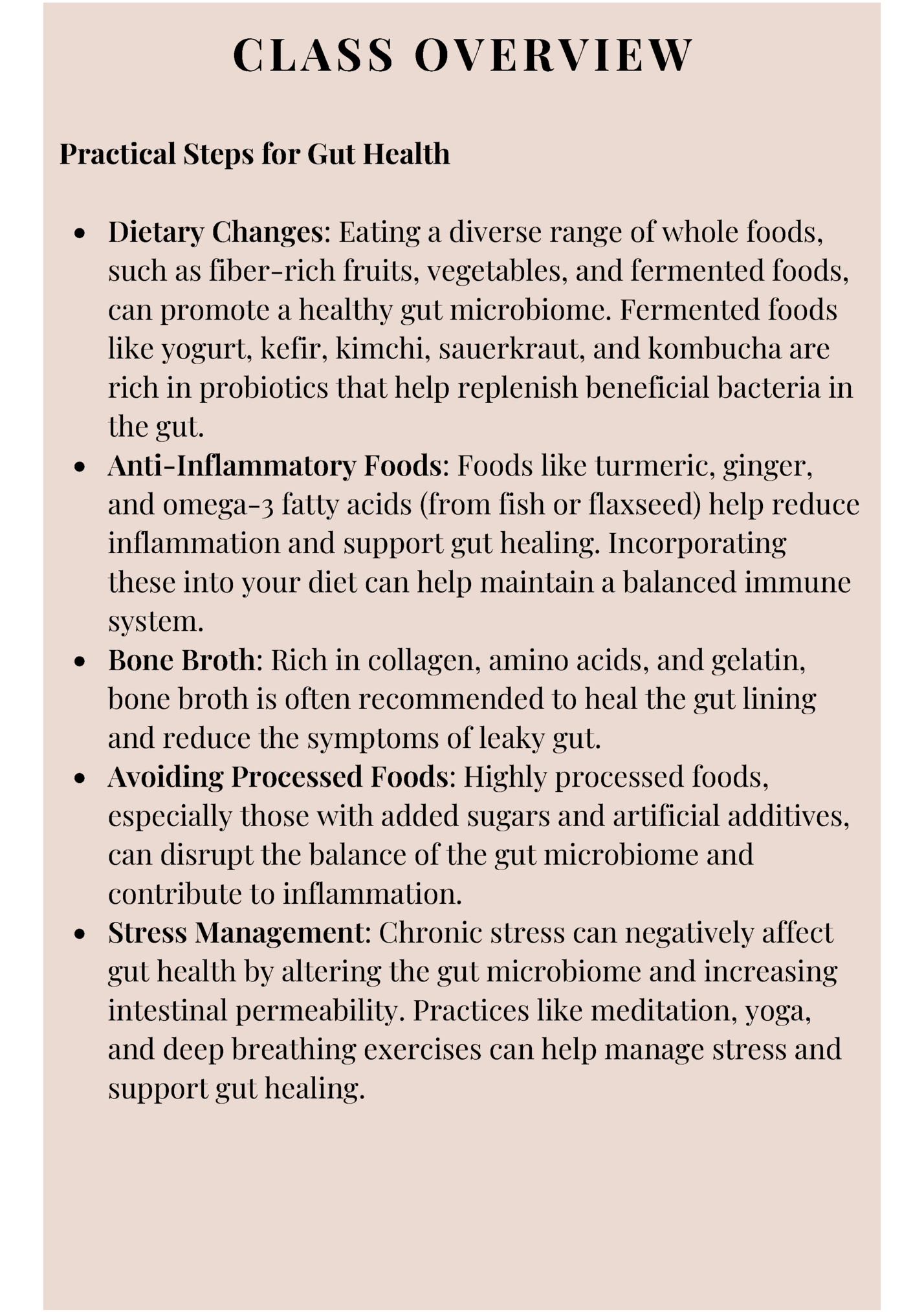
Q6: How can stress affect gut health? Stress can disrupt the balance of bacteria in your gut, leading to digestive issues such as bloating, diarrhea, or constipation. Chronic stress may also weaken the gut lining, making it more vulnerable to inflammation and "leaky gut," where toxins can leak into the bloodstream, affecting overall health. Q7: Is it true that gut health can affect mental health? Yes! There is a strong connection between the gut and the brain, often referred to as the "gut-brain axis." An imbalance in gut bacteria can lead to symptoms like anxiety, depression, and poor sleep because the gut produces many neurotransmitters, including serotonin, which affect mood and brain function. Q8: Can I improve my gut health overnight? Improving gut health is a gradual process. While eating gut-friendly foods and reducing stress can help, it takes time for the microbiome to balance out. It's important to be consistent with healthy habits, such as eating a diverse range of fiber-rich and fermented foods, staying hydrated, and getting enough sleep. Q9: Are there any foods that can harm my gut health? Foods that are highly processed, sugary, or rich in unhealthy fats can disrupt the balance of good bacteria in your gut. Excessive alcohol, artificial sweeteners, and low-fiber foods may also contribute to gut imbalances and digestive issues. It's best to focus on whole, unprocessed foods to support a healthy gut. Q10: How can I tell if I'm getting enough fiber for gut health? Fiber is essential for gut health, as it helps feed beneficial bacteria and promotes regular bowel movements. A general guideline is to aim for about 25–30 grams of fiber per day from sources like fruits, vegetables, whole grains, nuts, seeds, and legumes. If you're not reaching this amount, consider adding more fiber-rich foods to your meals.
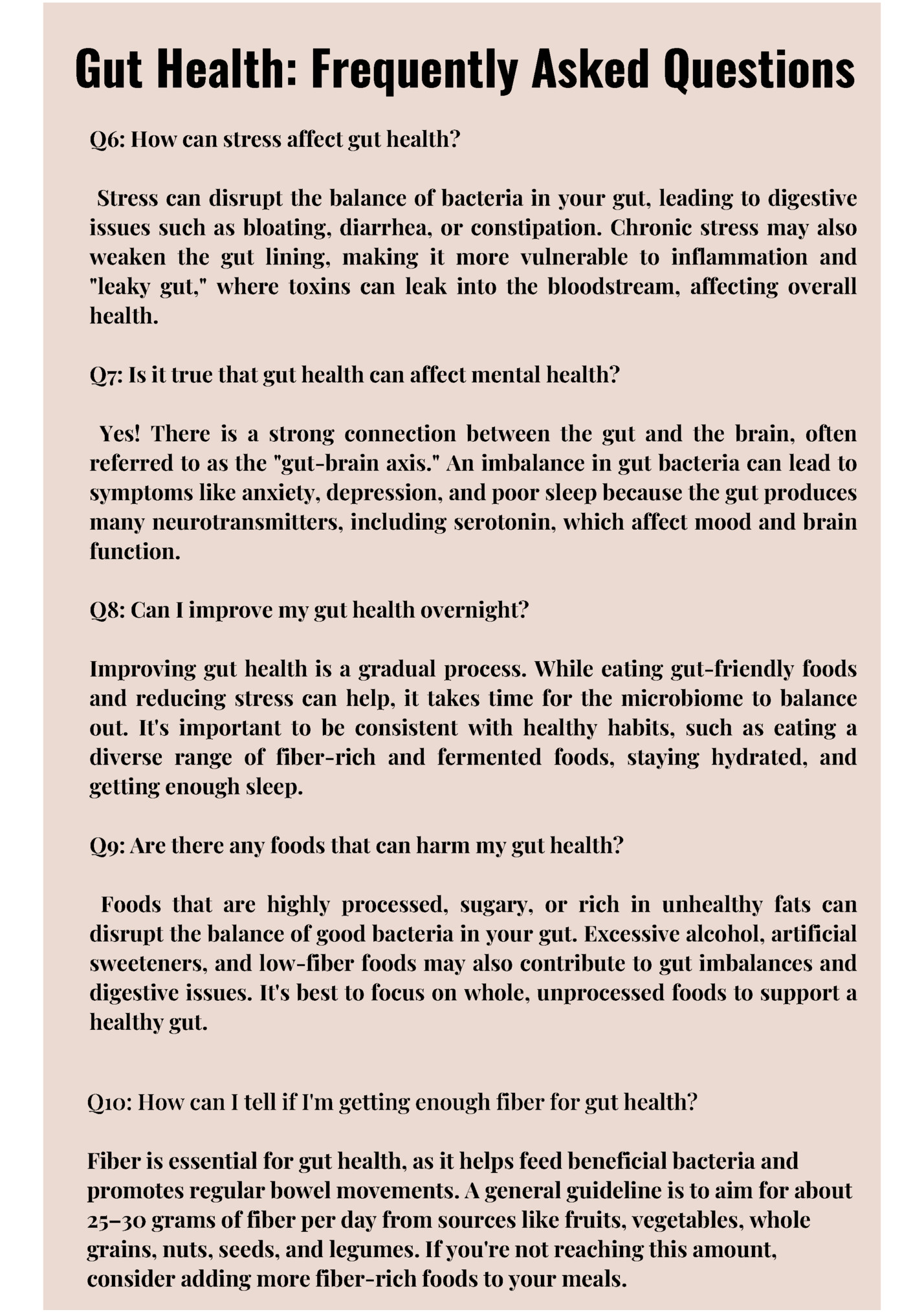
Q1: What is gut health, and why is it important? Gut health refers to the balance of microorganisms (bacteria, viruses, and fungi) living in your digestive system. These microorganisms are crucial because they help digest food, absorb nutrients, and protect against harmful pathogens. A healthy gut is essential for overall well-being, affecting everything from digestion to immunity and even mood. Q2: What is the microbiome? The microbiome is the community of microorganisms (bacteria, viruses, fungi, etc.) living in your gut. These microorganisms play a critical role in digestion, immunity, and overall health. A healthy microbiome is balanced, with beneficial bacteria outweighing harmful ones. Q3: How do I know if my gut health is off balance? Signs of an imbalanced gut may include bloating, gas, constipation, diarrhea, fatigue, skin issues, or frequent illness. An imbalance in the microbiome can lead to inflammation, digestive issues, and even affect your mental health. If you experience persistent symptoms, it's a good idea to consult a healthcare professional. Q4: What foods can help improve gut health? Foods rich in fiber, like fruits, vegetables, whole grains, nuts, and seeds, support digestion and feed beneficial gut bacteria. Fermented foods, like yogurt, kefir, kimchi, and sauerkraut, introduce good bacteria into your gut. Hydrating foods and drinks, such as coconut water and herbal teas, also promote a healthy digestive system. Q5: What are probiotics and prebiotics? Probiotics are live bacteria found in fermented foods (like yogurt, kefir, and kimchi) that can help introduce beneficial bacteria into your gut. Prebiotics are types of fiber found in plant-based foods (like garlic, onions, bananas, and asparagus) that feed the good bacteria in your gut. Together, probiotics and prebiotics work to maintain a healthy gut microbiome.
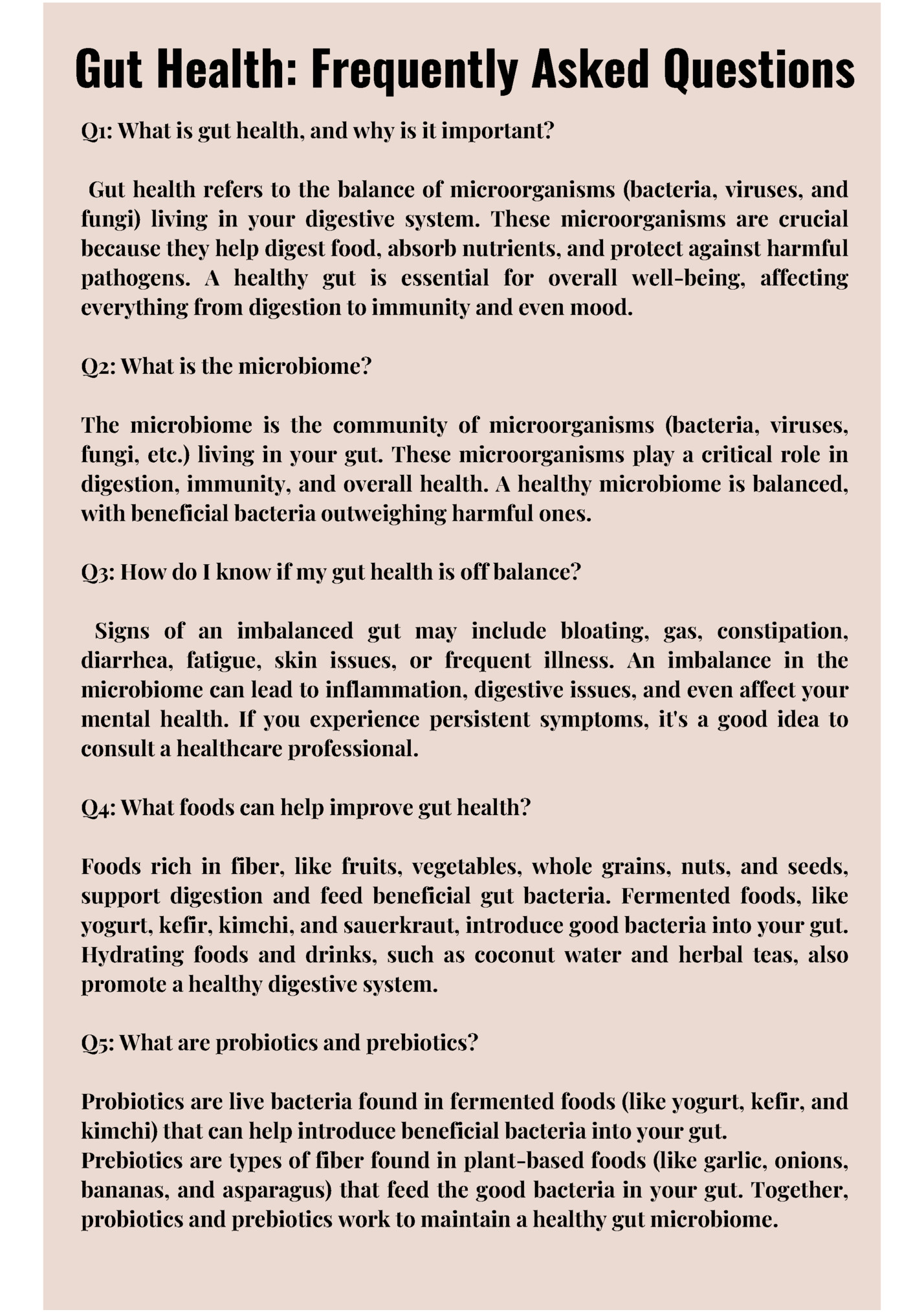
The Building Blocks of Gut Health
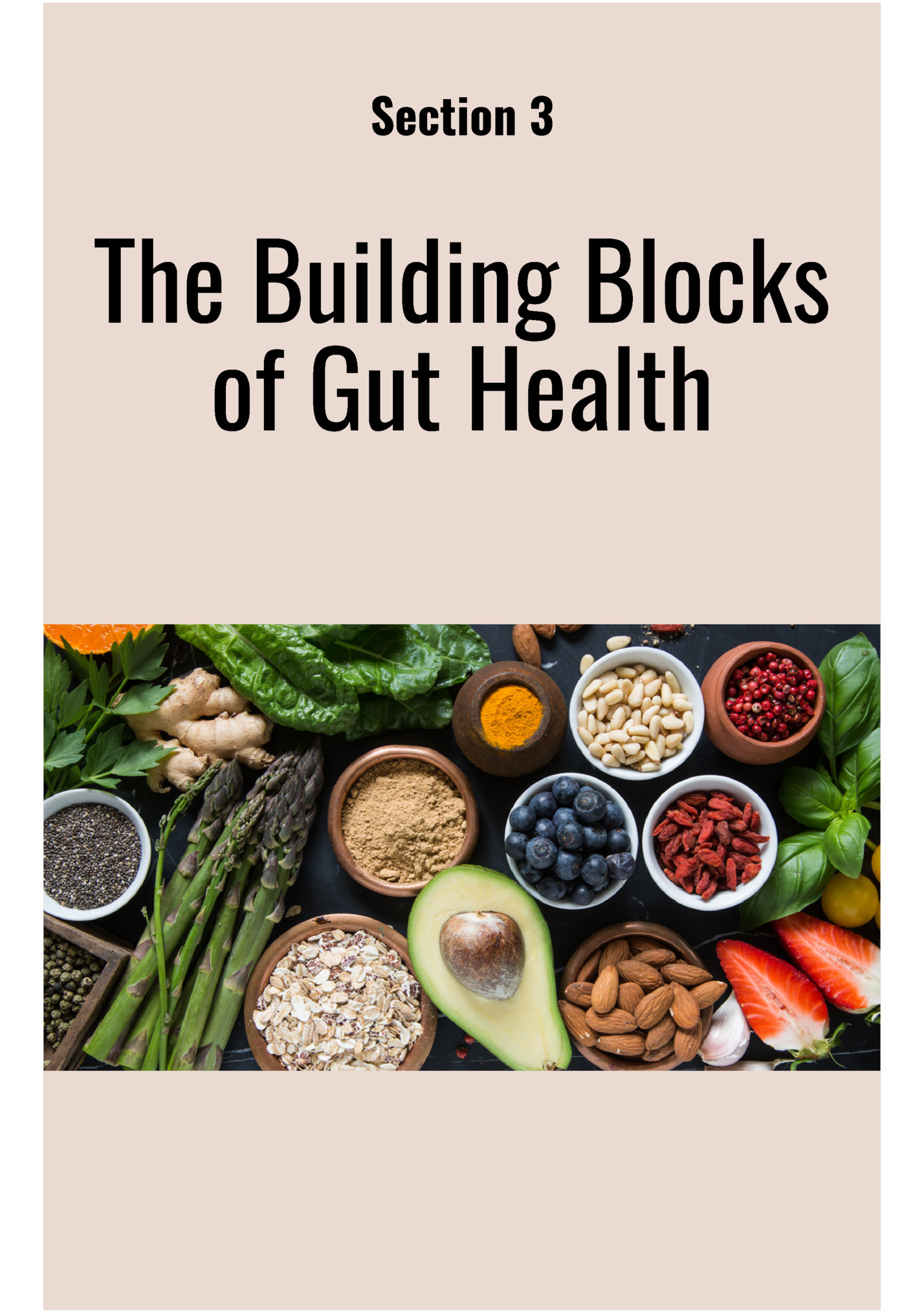
Nourishing Your Gut: Ancient Grains Ancient grains, such as quinoa, farro, spelt, and amaranth, are nutrient-dense foods that support gut health through their high fiber content, which helps to promote regular bowel movements and support healthy digestion. These grains are also rich in prebiotics, which serve as food for beneficial gut bacteria, SPELT Spelt is an ancient grain packed with dietary fiber, which helps maintain a healthy digestive system by promoting regular bowel movements and supporting the growth of beneficial gut bacteria. It contains a range of vitamins and minerals, including iron, magnesium, and B vitamins, which contribute to gut and overall health. Spelt is also easier to digest than modern wheat, making it a great option for those with mild sensitivities. FARRO Farro is an ancient grain rich in fiber, which promotes a healthy gut by supporting digestion and regular bowel movements. It contains complex carbohydrates that act as prebiotics, feeding beneficial gut bacteria and fostering a balanced gut microbiome. Farro is also a good source of zinc, magnesium, and B vitamins, which support digestive health and overall well-being. Its chewy texture and nutty flavor make it a versatile addition to a variety of gut-friendly dishes. TEFF Teff is a tiny, gluten-free grain that is naturally rich in fiber and prebiotics. Prebiotics nourish beneficial gut bacteria, promoting a healthy gut environment. Teff is also high in resistant starch, which helps regulate blood sugar and feeds gut bacteria, boosting overall digestive health. Its nutrient profile, including iron and calcium, further supports gut health and general wellness.
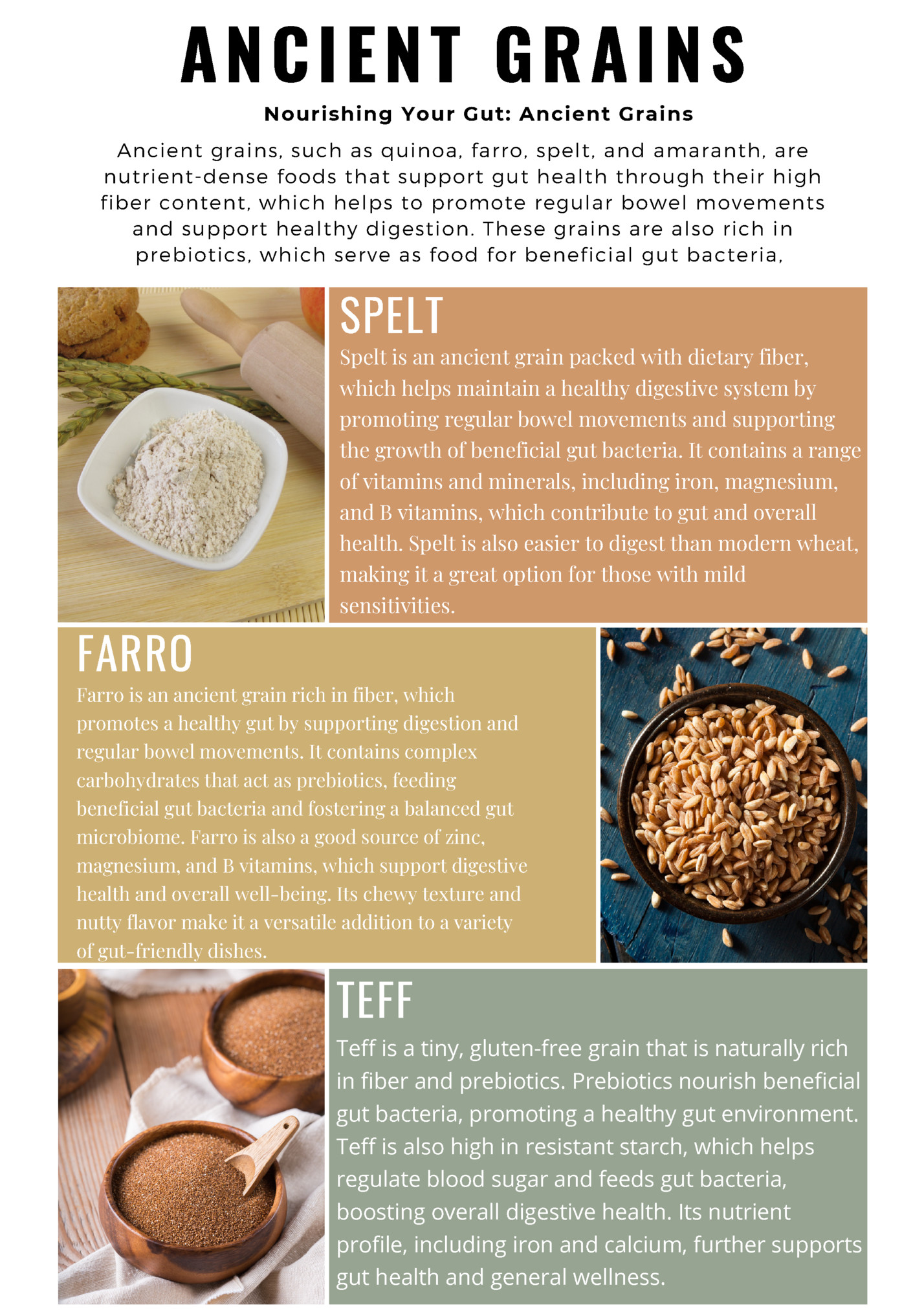
Fleepit Digital © 2021